The territory of Chile has been populated since at least 3000 BCE. By the 16th century, Spanish conquistadors began to colonize the region of present-day Chile, and the territory was a colony between 1540 and 1818, when it gained independence from Spain. The country's economic development was successively marked by the export of first agricultural produce, then saltpeter and later copper. The wealth of raw materials led to an economic upturn, but also led to dependency, and even wars with neighboring states. Chile was governed during most of its first 150 years of independence by different forms of restricted government, where the electorate was carefully vetted and controlled by an elite.

Chile's government is a representative democratic republic, whereby the President of Chile is both head of state and head of government, and of a formal multi-party system. Executive power is exercised by the president and by his or her cabinet. Legislative power is vested in both the government and the two chambers of the National Congress. The judiciary is independent of the executive and the legislature of Chile.

The Political Constitution of the Republic of Chile of 1980 is the fundamental law in force in Chile. It was approved and promulgated under the military dictatorship of Augusto Pinochet, being ratified by the chilean citizenry through a referendum on September 11, 1980, although being held under restrictions and without electoral registers. The constitutional text took effect, in a transitory regime, on March 11, 1981 and then entered into full force on March 11, 1990, with the transition of democracy. It was amended for the first time on 1989 and afterwards, on 1991, 1994, 1997, 1999, 2000, 2001, 2003, 2007, 2008, 2009, 2010, 2011, 2012, 2013, 2014, 2015, 2017, 2018, 2019, 2020, and 2021, these last three with relation the current constituent process. On September 2005, under Ricardo Lagos' presidency, a large amendment of the Constitution was approved by parliamentarians, removing from the text some of its more anti-democratic dispositions coming from Pinochet's regime, such as Senators-for-life and Appointed Senators, as well as the Armed Forces' warranty on the democratic regime.

Salvador Guillermo Allende Gossens was a Chilean physician and democratic socialist politician, who served as the 28th president of Chile from 3 November 1970 until his death on 11 September 1973. He was the first Marxist to be elected president in a liberal democracy in Latin America.

Juan Antonio Ríos Morales was a Chilean political figure. He was President of Chile from 1942 to 1946, during the height of World War II. He died in office.
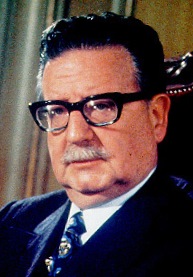
Presidential elections were held in Chile on 4 September 1970. Salvador Allende of the Popular Unity alliance won a narrow plurality in the public vote, before having his victory confirmed by a Congressional vote after the Christian Democrats voted in favour of his candidacy.
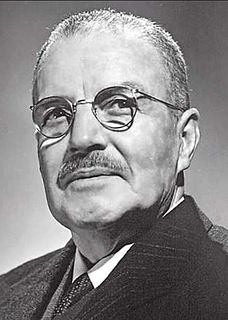
General Carlos Ibáñez del Campo was a Chilean Army officer and political figure. He served as President twice, first between 1927 and 1931, and then from 1952 to 1958, serving for 11 years in office.

Jorge Eduardo Alessandri Rodríguez was the 27th President of Chile from 1958 to 1964, and was the candidate of the Chilean right in the crucial presidential election of 1970, which he lost to Salvador Allende. He was the son of Arturo Alessandri, who was president from 1920 to 1925 and again from 1932 to 1938.

Salvador Allende was the president of Chile from 1970 until his 1973 suicide, and head of the Popular Unity government; he was the first Marxist ever to be elected to the national presidency of a liberal democracy in Latin America. In August 1973 the Chilean Senate declared the Allende administration to be "unlawful," due in large part to direction and intervention by the CIA over its expropriation of private property. Allende's presidency was ended by a military coup before the end of his term. During Allende's three years, Chile gradually was transitioned from a democratic republic into a Marxist state.
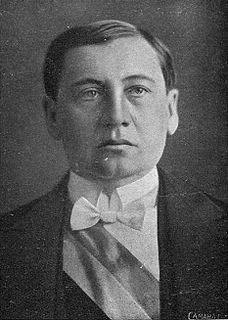
Arturo Fortunato Alessandri Palma, GCTE was a Chilean political figure and reformer, who served thrice as the President of Chile, first between 1920 and 1924, then for part of 1925, and finally from 1932 until 1938.
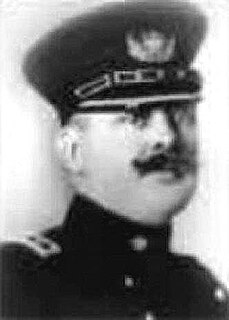
Division General Luis Altamirano Talavera was a Chilean military officer, minister, Vice President of the Republic and finally President of the Government Junta of Chile between 1924 and 1925.

The 1920 Chilean presidential election was the 22nd presidential election, held on Friday, June 25, 1920. The Liberal Alliance candidate Arturo Alessandri defeated the National Union candidate Luis Barros Borgoño in the last Chilean election to have been decided by the Electoral college. The results were a turning point for Chilean history, setting the end of the succession of oligarch and 19th-century governments and the start of a new, modern one run by the middle class.

Government Junta of Chile, was the political structure established to rule Chile following the anti-conservative military coup that assumed power after first interfering in progressive President Arturo Alessandri's deadlocked government. It ruled the country until it was ousted by yet another military coup, and gave way to the January Junta.
Government Junta of Chile, was the political structure established to restore power to President Arturo Alessandri, after he had been deposed in 1924. On January 23, 1925, a military movement of young officers, wrestled power from the previous September Junta. Then they organized a new Junta and recalled president Alessandri back to his post. The Junta lasted until Alessandri's resumption of power.
The Chilean coup d'état of 1925 took place on January 23, 1925, when the Chilean military overthrew the September Junta. Led by Colonel Marmaduque Grove, the troops arrested the Junta's President, General Luis Altamirano, and then handed the power to General Pedro Dartnell as interim President. The organizers of the coup hoped to recall former president Arturo Alessandri Palma, who had been forced into exile after the September Junta's coming to power. However, General Dartnell ultimately refused to rule alone and formed the January Junta a few days later, handing power to Emilio Bello Codesido. Alessandri only returned from exile on March 20, 1925, putting an end to the junta.
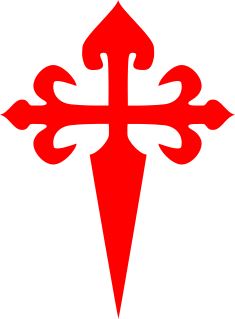
The Conservative Party of Chile was one of the principal Chilean political parties since its foundation in 1836 until 1948, when it broke apart. In 1953 it reformed as the United Conservative Party and in 1966 joined with the Liberal Party to form the National Party. The Conservative Party was a right-wing party, originally created to be the clericalist, pro-Catholic Church group.
The Chilean transition to democracy is in political history the period of time that succeeded the military dictatorship of Pinochet in 1990. During this period democratic institutions were strengthened and the political power of the military was slowly rolled back. While mostly used for Chile in the 1990s, historians have so far not agreed on its end date or if it continues to the present.

The Parliamentary Era in Chile began in 1891, at the end of the Civil War, and spanned until 1925 and the establishment of the 1925 Constitution. Also called "pseudo-parliamentary" period or "Parliamentary Republic", this period was thus named because it established a quasi-parliamentary system based on the interpretation of the 1833 Constitution following the defeat of President José Manuel Balmaceda during the Civil War. As opposed to a "true parliamentary" system, the executive was not subject to the legislative power but checks and balances of executive over the legislature were weakened. The President remained the head of state but its powers and control of the government were reduced. The Parliamentary Republic lasted until the 1925 Constitution drafted by President Arturo Alessandri and his minister José Maza. The new Constitution created a presidential system, which lasted, with several modifications, until the 1973 coup d'état.

The Presidential Republic is the period in the history of Chile spanning from the approval of the 1925 Constitution on 18 September 1925, under the government of Arturo Alessandri Palma, to the fall of the Popular Unity government headed by the President Salvador Allende on September 11, 1973. The period spans the same time as the "Development inwards" period in Chilean economic history.
The history of the Constitution of Chile dates from 1811. There were 10 constitutional texts and a draft for a federal organization in 1826. Its common elements are the unitary form of state and presidentialism as a form of government.












